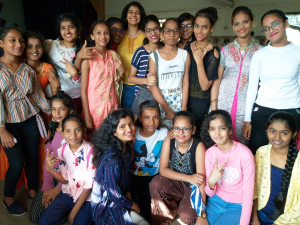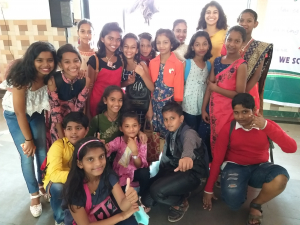Choir Leader Profile: Ria Master
Ria Master conducts the Songbound choirs at Sitaram Mills Public School. She started working as a Songbound Choir Leader in 2017, when she was just 18 years old.
How did you get involved with Songbound?
I received a message in a WhatsApp group: a short write up about the NGO and an urgent call for a Choir Leader. Coincidentally, a colleague of mine used to lead the choir recruiting and I had attended one of their performances. I had all the skills that were mentioned in the message and after a chat with Maureen, I felt that this would be a meaningful way to use my skills productively.
What difference does Songbound make to the children?
I think Songbound is an outlet for children to forget their worries about studies and personal problems. It’s a space where they can just be children of their age without burdens. This is clearly seen in their eagerness for concerts, where they look forward to something they enjoy. I periodically ask them why they want to be here and stay after school hours to attend choir. They reply: because I like it and want to learn new songs. The goal is not to train them into professional singers, but to provide the joy of music as a recreational, relaxing social activity.
There has been a tremendous change in the children who’ve been consistently part of the choir. They are less restless and their concentration has increased. As a result of this, they are able to grasp new information quicker than when we started working together. Increased concentration helps them in other spheres of their lives, giving them time to do something apart from a repetitive cycle of school and homework.
What is your favourite Songbound memory?
My favourite Songbound memory was at one of the concerts: a few girls from the senior choir were chosen to sing a solo and dance to the words. They were completely in the spotlight. Initially, during rehearsals they were really shy but in the concert they were confident and sang well. I was very proud of their growth. After the performance they ran up to me to tell me about the compliments they received from the audience.
Why do you believe music is important for children and young people?
Humans are drawn to music naturally. There is rhythm in everything that we do from our daily routines, heartbeats, breathing, etc. If our rhythm is disturbed, we feel anxious or clueless about what to do (exactly what happened in lockdown). I think music is something that is so subjective to geographic location, culture and individuals that anyone can feel at peace with some type of music. There is always music for someone. The immense range of genres brings out different moods and draws our attention to emotions which we are unable to express. There is music for every emotion that we feel; every milestone and celebration in our life.
Music is the best way to bring communities together. Music helps in the strengthening of the neural connections in the brain and supports neuroplasticity. It aids coordination, anticipation, counting, movement amongst other things. I strongly believe that music should be a part of every school’s curriculum in India and be treated with equal importance to other subjects, without the notion of it being an extracurricular activity.
How have you been keeping up with your choirs during the pandemic?
The last time I had a physical choir rehearsal was in the first week of March. After that there was a loud silence for 4 months. Once the school moved to online platforms, I was contacted by the teacher saying that some children were interested in online choir. I’m sure most of us didn’t know how to use Zoom and had never taught online. It was a new experience for me and I had a few mock sessions with friends to gain confidence before the first class.
I currently have weekly classes every Saturday for one hour with 13 children. Although the school has provided the children with internet data packs, some children have only one mobile device that is shared amongst their family. If they have an older sibling, their studies are given priority. Online learning can get very exhausting and the children tell me so themselves. I try to make the class as lively as I can from my screen, involving them to share their ideas and make it a collaborative, fun space.
It costs £10/month to support the professional development of a Choir Leader like Ria. Please donate what you can so that we can work with more talented musicians like her.





